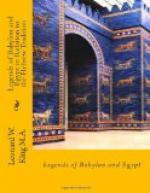LECTURE III — CREATION AND THE DRAGON MYTH; AND THE PROBLEM OF BABYLONIAN PARALLELS IN HEBREW TRADITION
In our discussion of the new Sumerian version of the Deluge story we came to the conclusion that it gave no support to any theory which would trace all such tales to a single origin, whether in Egypt or in Babylonia. In spite of strong astrological elements in both the Egyptian and Babylonian religious systems, we saw grounds for regarding the astrological tinge of much ancient mythology as a later embellishment and not as primitive material. And so far as our new version of the Deluge story was concerned, it resolved itself into a legend, which had a basis of historical fact in the Euphrates Valley. It will be obvious that the same class of explanation cannot be applied to narratives of the Creation of the World. For there we are dealing, not with legends, but with myths, that is, stories exclusively about the gods. But where an examination of their earlier forms is possible, it would seem to show that many of these tales also, in their origin, are not to be interpreted as nature myths, and that none arose as mere reflections of the solar system. In their more primitive and simpler aspects they seem in many cases to have been suggested by very human and terrestrial experience. To-day we will examine the Egyptian, Sumerian, and Babylonian myths of Creation, and, after we have noted the more striking features of our new material, we will consider the problem of foreign influences upon Hebrew traditions concerning the origin and early history of the world.
In Egypt, as until recently in Babylonia, we have to depend for our knowledge of Creation myths on documents of a comparatively late period. Moreover, Egyptian religious literature as a whole is textually corrupt, and in consequence it is often difficult to determine the original significance of its allusions. Thanks to the funerary inscriptions and that great body of magical formulae and ritual known as “The Chapters of Coming forth by Day”, we are very fully informed on the Egyptian doctrines as to the future state of the dead. The Egyptian’s intense interest in his own remote future, amounting almost to an obsession, may perhaps in part account for the comparatively meagre space in the extant literature which is occupied by myths relating solely to the past. And it is significant that the one cycle of myth, of which we are fully informed in its latest stage of development, should be that which gave its sanction to the hope of a future existence for man. The fact that Herodotus, though he claims a knowledge of the sufferings or “Mysteries” of Osiris, should deliberately refrain from describing them or from even uttering the name,(1) suggests that in his time at any rate some sections of the mythology had begun to acquire an esoteric character. There is no doubt that at all periods myth played an important part in the ritual of feast-days. But mythological references in the earlier texts are often obscure; and the late form in which a few of the stories have come to us is obviously artificial. The tradition, for example, which relates how mankind came from the tears which issued from Ra’s eye undoubtedly arose from a play upon words.




